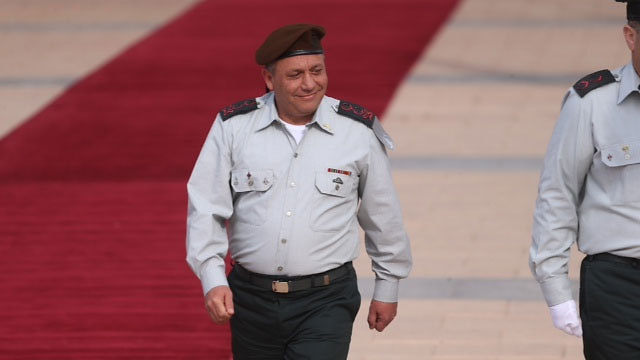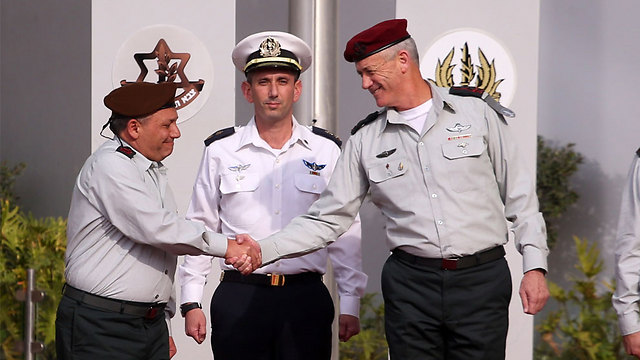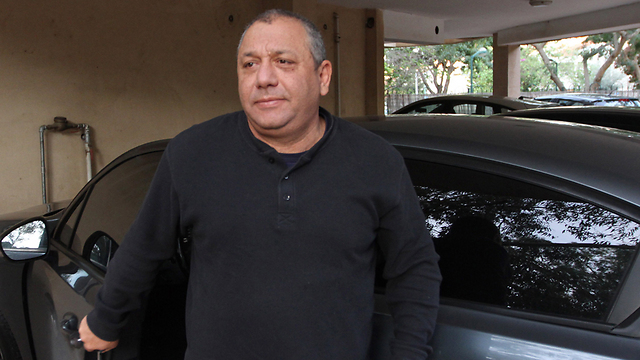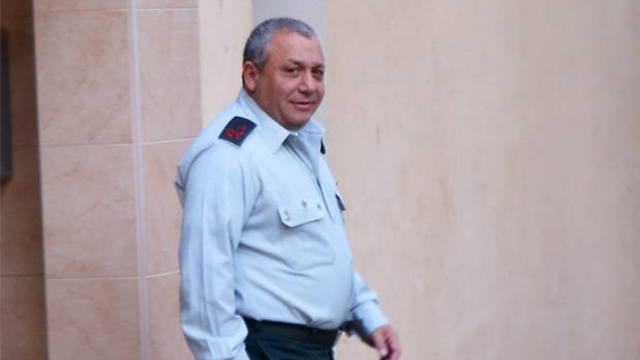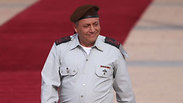
"In carrying out a mission, the promulgation of the order represents not over 10 percent of your responsibility," said Patton. "The remaining 90 percent consists of assuring, by means of personal supervision on the ground, by yourself and your staff, proper and vigorous execution."
After a Channel 10 program on the Second Lebanon War, Eisenkot trawled the Internet to locate the exact quote, in order to explain a conversation he had during the war with then-chief of staff Dan Halutz. In the program Halutz claimed that Eisenkot, then chief of operations, warned that on the ground, the army chief's commands were not being carried out.
"He said, 'Danny, you're not living in the real world. This is not the air force here. People will do whatever it takes to not obey your instructions. You give an instruction here, make sure it is carried out. Do not assume it will be."
This statement reinforces Halutz' argument that the Northern Command did not function properly.
Eisenkot remembered the – alarming, it has to be said - conversation, and he did not deny the report. It took place during a discussion on the chief of staff's schedule, in which Halutz recommended that Eisenkot spend time in the field to ensure that orders emanating from the Kirya in Tel Aviv were being carried out.
Eisenkot was not exposing a state secret. It has been part of the culture of the ground branch of the army for decades. The combination of lack of discipline and control problems often leads to cutting corners and non-fulfillment of orders. The army is not the Air Force, whose commander can at any time see where every warplane is and can talk directly with each pilot in the cockpit.
The time it takes from the moment an order is given by the General Staff to its implementation by ground units is fundamentally different from the pace of the air force and even the navy. It can sometimes take hours from when an order is given in Tel Aviv until it begins to show on the ground, and when that happens the order is not always still relevant to the evolving operational reality.
The land forces generals all knew this sad fact during the war, but Eisenkot said it loudly and bluntly. Now he himself must internalize the wisdom of Patton.
In the IDF, there is no talk of a hundred days of grace, as there is in politics, and besides, the chief of staff comes to his post with very rich experience. But in his first hundred days, the chief of staff should lay out the main direction of his term. In the military, processes take so long, what is not announced in the early days may well be very difficult to implement in the future.
Of the previous chiefs of staff, Amnon Lipkin-Shahak initially spoke of rejuvenation and manpower reforms, making Moshe Ya'alon – a young general who would later also lead the IDF - head of Military Intelligence, and sending home the elders of the paratroopers. Ehud Barak spoke on his first day of the revolution of precise guided munitions, while Shaul Mofaz spoke of the ground forces.
Eizenkot, who knows well the weaknesses of the army, talks about significant changes in the perception of the way in which ground forces operate, allowing them to deal properly with unceasing and concrete threat of global Islamic terrorism. This enemy has no one central address, which could lead to a very short war, if at all. One element of this enemy - Hamas and Hezbollah – is known. Others are still a mystery.
The IDF knew how to concentrate its forces against strategic threats. It acquired stealth aircraft, submarines, built cyber capabilities, made quantum leaps in intelligence. But the army is still looking for its place in the new era. It is struggling to find the right formula to boost its performance against the threat posed by terrorism along Israel's borders; it continued to launch tons of explosives against Saja'iyya in the Gaza war and send in large numbers of armored forces - simply because it has no other solution.
Halutz tried to bring about a comprehensive reform of the ground forces, but it did not materialize. Gantz started the process of removing the heavy divisions and begin training for combat missions in Lebanon. Eisenkot will try to take the next step. Last week, he showed the ground forces commander, Major-General Guy Tzur, his vision of the future army. There is no major revolution that will inevitably change the relationship between branches of the army, but a plan that contains the seeds of the reforms that would see the land forces structured entirely differently.
Meanwhile, Eisenkot is making unprecedented comparisons in the budget for the army and the budget for the Air Force. This in itself is a minor revolution. Even before taking office, he met with all the ground forces brigadier generals and outlined his intentions as army chief.
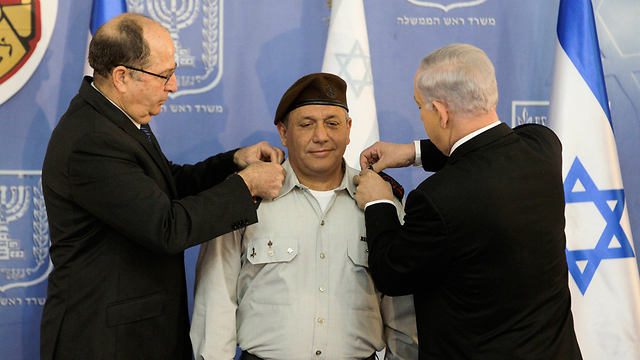
In the first hundred days, the chief of staff presents himself both to the army and to the public. Eisenkot emits an air of modesty, of stability. Perhaps it was not intentional, but he finds himself in the role of "elder," a judicious and responsible adult.
When operational ideas arrive on his desk that he considers too adventurous or not developed enough, he recommends the "carpenters' method."
A good carpenter measures seven times before he cuts a piece of wood. Once a cut is made, there is no going back. This is his message: "Do not bring me half-baked plans. I understand exactly what you're doing, so do your homework well."
Eizenkot continues the pattern set by Gantz regarding activities deep in the so-called "war between the wars". In his bureau, too, occasionally appear the names of countries that are very far from Israel, but in which the state has an operational interest.
He debates and says: "Do not forget, we are the power in the region. The use of force requires recognition of limitations and understanding the implications." It did not trouble him, however, to approve bombing in southern Gaza on the evening after Independence Day, even though it was clear that the preceding rocket attack on Israel was not launched by Hamas.
Earlier this week, GOC Southern Command Gen. Sami Turgeman told officials in the south: "Currently, there is no substitute for Hamas in the Gaza Strip. The substitute for Hamas is the IDF and governmental chaos."
Eisenkot's worldview regarding Gaza is not significantly different to this. His policy is based on two principles: an attempt to curb a Hamas buildup, while doing everything possible to introduce some hope for Gaza, so they have something to lose. Eisenkot is an advocate of using aid to rebuild Gaza.
He does not rule out, for example, a plan to establish distant port that would serve the Gazans – in Cyprus, for example. Here he sees eye to eye with the Coordinator of Government Activities in the Territories, Major General Yoav Mordechai, one of the people closest to him. Both believe that if hope grows, conflict will be delayed. Defense Minister Ya'alon, however, does not believe in an independent Hamas port, near or far, nor in direct dialogue with Hamas to reach a long-term truce. The line Ya'alon dictates to the army is very clear: Any agreement or discussions regarding Gaza come through Egypt.
But the Egyptians see any arrangement with Hamas coming through the Palestinian Authority in Ramallah, and the PA does not get along with Hamas, so here it remains stuck. The chief of staff's impact on the situation in the Gaza Strip is very limited. Eisenkot, incidentally, believes that Gaza remains the most explosive front. Just days ago he toured the Gaza border and inspected the readiness of the forces there.
Overall, Eisenkot has in his early days behaved as if he were waging a form of war against the army itself. This is typical behavior for new chiefs of staff: Surprise visits, maneuvers, increased preparedness. Let them know that there is a new sheriff in town. But Eisenkot is no longer a new sheriff.
And he has come up with some very interesting maneuvers. As part of Northern Command exercises, for example, he used the traditional Lag BaOmer gathering on Mount Meron to practice moving convoys along roads with hundreds of stranded and jammed vehicles. With exercise like this, he is learning firsthand about the readiness of the army and setting the standard for the level of preparedness he requires. Again, this is typical behavior for commanders who came from the ground troops, and who carry the remnants of the 2006 war.
Eisenkot will do everything to not get caught with his pants down. His instructions to the Planning Division from day one were not to touch training programs. Reduce maintenance, cut the food rations. But do not touch the training, for this is the way to raise the immediate level of professionalism.
The defense establishment and the IDF are now discussing the implications of the Iran agreement on the Israeli military buildup. If they come to the conclusion that the Iranian threat is a while away, it may be advisable to divert part of the military budget designed earmarked for the Iranian issue to more urgent areas, such as the ground forces and cyber defense. The military, under Eisenkot's guidance, is also mulling the possibility of establishing a Cyber Command.
In recent weeks, there has been intensive dialogue between the Northern Command and the General Staff, in which operational plans for this front have been reviewed. The meetings are held alternately at command headquarters in Safed and the Galilee. It seems that the most pressing issue is to synchronize the basic concepts so that everyone - the General Staff, Northern Command and other branches – are clear on what they are talking about. What comes, for example, after the "victory"? The occupation of Beirut? The overthrow of Hamas? What is considered "victory"? How does one define "attrition"?
Eisenkot's desire to lower his profile and concentrate on the army raises quite a few questions. People have asked - and rightly - where the chief of staff was when the entire public was appalled by police violence against Ethiopian Israeli soldier Damas Pikada. He had been expected to publicly condemn police brutality against the people in uniform, particularly when it is motivated by racism. Eizenkot spoke with Pikada who said to him, "Chief of Staff, protect the Ethiopian people."
In further discussion with military staff, Eisenkot discussed the options to help integrate Ethiopians into the army. He ordered his inferiors to increase the number of Ethiopians attending pre-army training courses in Mihve Alon, a northern base that specializes in educational and cultural courses. In his view, if this had been published, it would have been considered populism. Here he is wrong. The public has expectations of its chief of staff. People want to hear what he has to say on social issues as well as military ones. The letter issued by the Chief of Staff last week, regarding sexual harassment between commanders and their soldiers, is perhaps a display of lessons learned from his silence on social-military issues.













